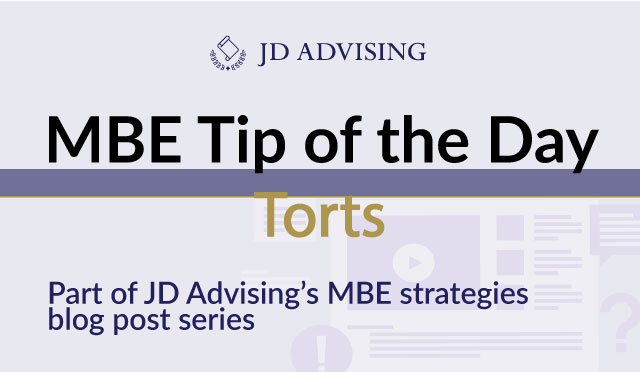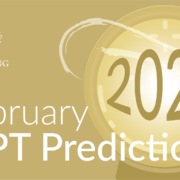MBE Strategies Tip #1 – Torts
Welcome to our MBE tip of the day series. This “MBE tip of the day” post focuses on Torts!
You will see 25 scored Torts MBE questions on the Multistate Bar Exam. In this post, we will review a Torts question together. Note that we have posted several MBE tips (which you can find links to at the bottom of this post) that focus on a specific multiple-choice question that many students answer incorrectly. If you can master these questions, it could increase your MBE score by that many points if you see any of these issues tested again (which, by the way, you will!). These posts of MBE tips and tricks will not only cover substantive law but also strategy. So each “MBE tip of the day” post covers one highly-tested area of substantive law as well as an important MBE strategy. You can sign up to receive these posts directly to your inbox for the upcoming administration at the bottom of this page.
We are going to cover a point of the substantive law of negligence that many students have trouble with. We will also cover a general tip for answering questions—that is to slow down and get in the habit of answering some questions slowly and methodically rather than racing through them.
Do your best to answer this question (before even looking at the answer choices and before looking at the answer below!) In order to get in the habit of answering questions slowly and methodically, ask yourself the questions that are outlined below: What is the subject? What is the legal issue? What is the rule and analysis? What is the conclusion? Try to answer these beginning questions before even reading the answer choices.
Then you can uncover the Torts answer as well as read more about our MBE strategy of the day — to answer questions slowly and methodically.
Show the Torts question
Torts MBE: Question:
A law student was studying with his friend in a coffee shop in a high-crime area. The law student had to use the restroom and asked his friend if the friend would watch his laptop computer while he used the restroom. The friend agreed. Soon after the law student left to use the restroom, the friend also left the laptop computer unattended so that the friend could refill his cup of coffee.
The law student and the friend both returned to the table approximately five minutes later to find that the laptop was missing. It was later discovered that the laptop had been stolen.
If the law student sues the friend for negligence, will he prevail?
(A) No, because the friend had no duty to watch the laptop computer.
(B) No, because the friend’s breach of duty was not the proximate cause of the harm suffered.
(C) Yes, but only if the student tries to recover from the thief first.
(D) Yes, because the friend knew that the law student was relying on her to watch the computer.
Subject:
Legal Issue:
Legal Rule and Analysis: (If you need to look at your outline to find the legal rule, feel free to use it when you have not yet memorized the subject. Using your outline will help you actively learn and memorize your outline!)
Conclusion:
Look at the answer choices provided. Choose an answer choice that matches your conclusion. Review the other answer choices provided.
Show answer
Answer to Torts Question:
A common mistake in Torts MBE questions: Students forget that just because there is a “really guilty” party does preclude a person from suing the “less guilty” party.
Here is our analysis of this Torts question:
Subject: Torts
Legal Issue: Is the friend liable for negligence?
Legal Rule and Analysis: The elements of negligence are: duty, breach, cause and harm. You need all four elements to prevail.
- Did the friend have a duty to watch the laptop? Yes, because he volunteered to and the law student relied on him. (Normally one does not have a duty to watch the items of others, but reliance created the duty.)
- Did the friend breach his duty? Yes, when he got up to fill the coffee mug.
- Was the breach an actual cause of the harm? Likely yes, since the laptop likely would not have been stolen had the friend been watching it.
- Was the breach a proximate cause of the harm? Likely yes. This is the exact kind of foreseeable harm that comes with leaving a laptop unattended in a high crime area. Ask yourself, “When you see what the friend is doing to breach his duty, what are you worried will happen?” Pretend you are watching a movie and pause the movie as soon as you see the breach occurring. What would you predict would happen as soon as you saw the friend leave the computer unattended? You would likely predict the theft of the laptop! (Note: It doesn’t matter if the law student could sue the thief too – he can technically go after both the friend and the thief (but only recover once).
- Was there harm? Yes. The harm is the value of the laptop.
Conclusion: Yes, the friend is liable. The friend had a duty and breached it. (D) is therefore the correct answer.
(A) is incorrect. The friend did have a duty to watch the laptop computer. This duty was created when the friend agreed to keep an eye on the computer.
(B) is incorrect. The friend’s breach of duty was the proximate cause of the harm suffered because this is the exact type of harm that one would worry would occur if the computer was left unattended in a high-crime area.
(C) is incorrect. The law student does not have to try to recover from the thief first. He can seek damages from his friend based on the friend’s negligence.
Answering a question slowly and methodically like this (i.e., by forcing yourself to identify the issue, rule, analysis, etc.) can be extremely helpful for the following reasons:
First, by answering them slowly you will be truly thinking through the answer. When you see this issue again, you will not have to spend all of this time thinking about it since you have already put a lot of time, thought, and energy into it. You will just know it! (I call this “prethinking” about answers to questions!)
Second of all, when you answer them slowly, paradoxically, you will speed up! Again, this is because you will not have to spend as much time on the question if you have already spent a lot of time dissecting the issues. (Timed exams are always a good idea, but slowing down can truly be key to speeding up!)
This is why many researchers do not advise students to answer 30 or 50 or 100 questions a day. Many MBE researchers advise students to answer six questions a day (and say that it should take students an hour to do them!) We do not quite advise six, but their point is well-taken. If you do less questions, but do them right, you will see your score increase.
So instead of quickly answering 50 questions a day and then checking your answer for all 50, our tip today is to try answering questions one-by-one, slowly and methodically. (This is not to say there is something wrong with answering questions in a timed setting–indeed you will need to! But slowing down is key to improving.
If you want to try another Torts question (that tests the same issue above), utilizing the same strategies, please uncover it below.
Show Torts Practice Question #2
Practice Question #2 for Torts
A woman hired a driver to drive her across town to her sister’s house. The driver negligently failed to pay attention to where he was going and drove in the opposite direction of the sister’s house. By the time the driver realized his error, it was too late to drive the woman back home. Thus, the driver paid for the woman to stay in a hotel room for the night. While the woman was dining at the hotel that evening, a man pickpocketed the woman’s expensive pair of glasses out of her purse.
The woman sued the driver for the value of the glasses. Should she prevail?
(A) Yes, since the driver negligently failed to pay attention to where he was going.
(B) Yes, so long as the woman was not negligent in failing to notice the driver was going the wrong way.
(C) No, since larceny is not a foreseeable result of the breach by the driver.
(D) No, since the act of larceny was committed by a third person, not the driver.
Show answer.
Answer to Practice Question #2:
Common Mistake: Students forget what proximate cause is.
Subject: Torts
Legal Issue: Is the driver liable for the value of the glasses due to his negligence?
Legal Rule and Analysis: The elements of negligence are: duty, breach, cause and harm. Remember, you need all of them to prevail in a negligence claim!
- Did the driver have a duty to pay attention to where he was going when he was driving? Yes.
- Did the driver breach his duty? Yes.
- Was the breach of duty an actual cause of the harm (or would the harm have occurred anyway)? Yes, it is an actual cause. The glasses wouldn’t have been stolen if the driver hadn’t drove the wrong way because the woman would not have stayed at the hotel.
- Was the breach of duty a proximate cause of the harm? Was this harm a foreseeable result of not paying attention to where one was going when one was driving? Likely not! There are many foreseeable results (i.e. she could be late to an important event) but this is not one of them.
- Did the woman suffer harm? Yes, the value of the glasses.
Conclusion: Because not all of the elements of negligence are met, the woman will not prevail.
Choose an answer choice that most closely matches your conclusion and explain why the others are incorrect: (C) above matches this exactly. (A) is true but just because someone is negligent does not mean that they are liable for everything that happens as a result of their negligence. (B) is not correct since foreseeability is still a missing element. (D) is not correct since (as noted in the prior question) one can still be liable for harm caused by third parties if it was a foreseeable result of one’s negligence.
Show two key takeaway points for the day
Key Takeaways for the day:
Takeaway for the Law: Beware of proximate cause issues in Torts. Remember that they key in determining whether proximate cause is present is to determine whether the harm was foreseeable. Even if there is a “more guilty” party (i.e. a criminal) the “less guilty” party (the person who was merely negligent) can still be liable if that crime was a foreseeable result of their breach of duty.
Takeaway for Practicing: Slow down! Try answering questions one-by-one, slowly and methodically, asking yourself the above questions (“What is the legal issue? What is the legal rule?, etc.) even if it means you answer less questions. You will find that you will start to answer them better, be more confident in your answers, and even review the law better.
If you would like to see “MBE tip of the day” posts from prior days, please click on the links below:
Show MBE tip posts from past days
- MBE Strategies: Day 1 – Torts (negligence)–and how to approach MBE questions.
- MBE Strategies: Day 2 – Criminal Law (homicide) — and learning through “wrong” answers.
- MBE Strategies: Day 3 — Evidence (hearsay) –and memorizing the details!
- MBE Strategies: Day 4 – Contracts and Sales – and spending time on the subjects that are difficult for you.
- MBE Strategies: Day 5 – Real Property (future interests) – and spending time on the highly-tested areas of law.
- MBE Strategies: Day 6 – Civil Procedure (summary judgment) – and eliminating incorrect answers.
- MBE Strategies: Day 7: Constitutional Law (political question, standing) – and how to answer a question correctly when you are in between two choices.
- MBE Strategies: Day 8: Evidence (hearsay, best evidence rule) – and why it is good to fine-tune your knowledge of the “red herring” areas of the law.
- MBE Strategies: Day 9: Torts (conversion) – and where to get actual released MBE questions!
- MBE Strategies: Day 10: Criminal Procedure (5th Amendment) – and how to pick between two answer choices.
- MBE Strategies: Day 11: Contracts (contract formation) – and what to do if you “overthink” questions.
- MBE Strategies: Day 12: Real Property (deed delivery) – and jotting out the fact pattern.
- MBE Strategies: Day 13: Civil Procedure (jurisdiction) – and “bringing it all together”.
- MBE Strategies: Day 14: Constitutional Law (taxing and spending) – and why to answer more Constitutional Law and Civil Procedure questions.
- MBE Strategies: Day 15: Constitutional Law (powers of congress) – and how to get better at Constitutional law questions.
- MBE Strategies: Day 16: Criminal Procedure (exclusionary rule) – and paying attention to the call of the question.
- MBE Strategies: Day 17: Evidence (character evidence) – and how to tell a civil case from a criminal case (and why it matters!).
- MBE Strategies: Day 18: Real Property (joint tenancy) – and how to get more Real Property questions right!
- MBE Strategies: Day 19: Civil Procedure (JAAMOL) – and how to learn Civil Procedure.
- MBE Strategies: Day 20: Torts (joint and several liability) – and tips on MBE default rules.
- MBE Strategies: Day 21: Evidence (hearsay) – and the importance of memorizing the law!
- MBE Strategies: Day 22: Contracts (formation) – and why you should not ignore the written portion of the bar exam!
- MBE Strategies: Day 23: Criminal Law and Procedure (and the importance of mens rea).
- MBE Strategies: Day 24: Constitutional Law (equal protection) – and the importance of writing incorrect answers down!
- MBE Strategies: Day 25: Civil Procedure (impleader) – and free released NCBE questions!
- MBE Strategies: Day 26: Real Property (future interests) – and learning the highly tested MBE topics.
- MBE Strategies: Day 27: Torts (intentional torts) – and the importance of learning rule statements.
- MBE Strategies: Day 28: Evidence (impeachment) – and how to keep impeachment, character evidence, etc. straight!
- MBE Strategies: Day 29: Criminal Procedure (line-ups) – and how charts can help you keep the 5th, 6th, and 14th Amendment straight!
- MBE Strategies: Day 30: Contracts (revocation of acceptance of goods) – and how finding patterns in your answer sheet can improve your score.
- MBE Strategies: Day 31: Constitutional Law (public v. private forum) – and last-minute MBE tips.
- MBE Strategies: Day 32: Torts (premises liability) – and eliminating incorrect statements of law.
- MBE Strategies: Day 33: Criminal Law (robbery) – and knowing your state vs. MBE distinctions.
- MBE Strategies: Day 34: Real Property (priority and recording acts) – and writing answers to the questions.
- MBE Strategies: Day 35: Torts (comparative negligence, joint and several liability) – and learning the theories behind the laws.
- MBE Strategies: Day 36: Contracts and Sales (recovering the purchase price) – and creating a timeline of events when answering MBE questions.
- MBE Strategies: Day 37: Constitutional Law (1st Amendment) – and making a diagram as you study.
- MBE Strategies: Day 38: Evidence (extrinsic evidence) – and learning the definitions of basic legal terms.
- MBE Strategies: Day 39: Civil Procedure (motion to dismiss) – and creating a timeline of the judicial process while studying.
- MBE Strategies: Day 40: Real Property (present and future interests) – and the importance of grammar.
- MBE Strategies: Day 41: Torts (battery) – and paying close attention to the call of the question.
- MBE Strategies: Day 42: Criminal Procedure (4th Amendment) – and why you shouldn’t skip straight to the narrow rules.
- MBE Strategies: Day 43: Criminal Law (burglary) – and why you need to know the elements of crimes!
- MBE Strategies: Day 44: Contracts and Sales (damages) – and answering the question in your head first.
- MBE Strategies: Day 45: Constitutional Law (interstate commerce and equal protection) – and paying attention to which entity is attempting to act.
- MBE Strategies: Day 46: Evidence (impeachment) — and how to identify the applicable evidentiary rule.
- MBE Strategies: Day 47: Civil Procedure (full faith and credit clause and preclusion) – and newly released NCBE civil procedure questions.
- MBE Strategies: Day 48: Civil Procedure (removal) – and understanding the policies behind the rules.
- MBE Strategies: Day 49: Real Property (eviction) – and the importance of paying attention to details!
- MBE Strategies: Day 50: Torts (trespass) – and the importance of memorizing the elements and categories of torts.
- MBE Strategies: Day 51: Evidence (lay witness testimony) – and avoiding distractions.
- MBE Strategies: Day 52: Civil Procedure (automatic disclosures) – and eliminating answer choices.
- MBE Strategies: Day 53: Torts (duty of a premises possessor) – and to not feel too sorry for vulnerable plaintiffs!
- MBE Strategies: Day 54: Real Property (equitable servitudes) – and finding differences in concepts.
- MBE Strategies: Day 55: Civil Procedure a bonus FIVE MBE tips!
- MBE Strategies Day 56: Constitutional Law (equal protection) – and memorizing the standards of review.
- MBE Strategies Day 57: Contracts (installment contracts) – and learning the nuances of the law.
- MBE Strategies Day 58: Criminal Procedure (5th Amendment) – and understanding the scope of constitutional rights.
- MBE Strategies Day 59: Civil Procedure (exception to final judgment rule) – and understanding the rules and their exceptions.
- MBE Strategies Day 60: Evidence (which law applies to privileges in federal court) – and the importance of knowing the law.
Looking for additional MBE help?
If you are looking for MBE help, read our 10 expert MBE tips here. Check out our step-by-step guide to improving your MBE score, please review this post for an overview of tips. If you would like to have the next MBE tip emailed to you when we come out with another one, please fill out the form below.
MBE Tip of the Day
Seeking MBE Assistance?
Seeking MBE Assistance?
- 📘 MBE Guide: Equip yourself with our FREE expert-crafted bar exam and MBE guides.
- Free Bar Exam Resource Center: Discover top resources, articles, and free webinars led by renowned bar exam professionals.
Top Resources as Vouched by our Students:
- MBE One-Sheets: One of our most highly acclaimed bar exam supplements!
- Bar Exam Outlines: Our comprehensive and condensed bar exam outlines present key information in an organized, easy-to-digest layout.
- MBE Private Tutoring: Opt for personalized, effective strategies.
- On Demand Bar Exam Course: Comprehensive bar exam preparation.
- Bar Exam Crash Course and Mini Outlines: Acclaimed and effective for a quick refresher.
- MBE Mastery Class, Real MBE Questions, and MBE Guide: Elevate your MBE preparation with these high-quality MBE supplements!
🔥 NEW! Check out our Repeat Taker Bar Exam Course and get introduced to our unmatched platinum Guarantee Pass Program.








Comments are closed.